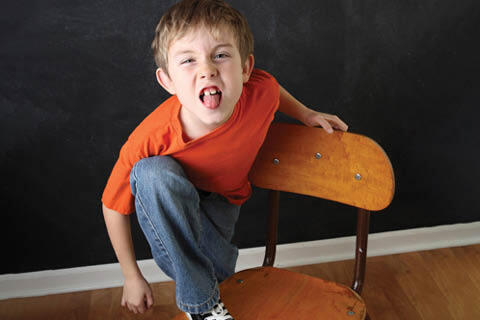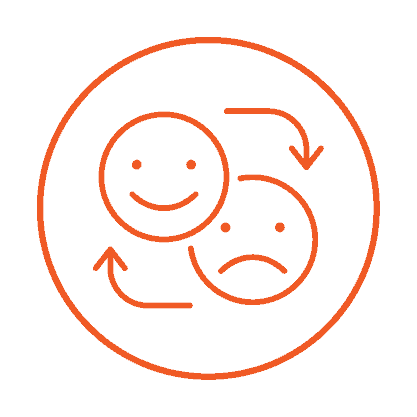
Self-Regulation Training System
Empower your staff with evidence-based strategies to build students' life skills.
Brad Chapin created the Self-Regulation Training System from a practical, research-based foundation, and his strategies have helped thousands of students develop the skills needed to achieve academic success, maintain emotional control and experience healthy social interaction.
In a pilot study of fourth grade classrooms who implemented the Self-Regulation Training System, office discipline referrals decreased by 83%.
Self-regulation skills help students better handle:
• Academic challenges
• Classroom behavior issues
• Anger issues
• Self-esteem struggles
• Anxiety
• Defiance
• Social difficulties
• Impulsiveness

ATTEND THE TRAINING
Evidence-Based Strategies to Teach Social Emotional Skills

Evidence-Based Strategies to Teach Social Emotional Skills
When a student can’t read, we teach him how. When a student struggles with algebra, we give her skills to help. When a student has trouble behaving, what do we do?
Self-Regulation skills can be taught. Not all students have the same ability to regulate emotions, behaviors and responses to difficulties. And those who have not mastered Self-Regulation can be very disruptive to instruction time. When educators include lessons on Self-Regulation as part of the curriculum, everyone can benefit from the training on how to recognize triggers and how to manage responses to them. Rather than trying to modify behavior and/or removing the stimuli that results in unacceptable behavior, Self-Regulation training gives students control over their responses.
Self-management is a key element of social-emotional learning. The Collaborative for Academic, Social, and Emotional Learning (CASEL) defines self-management as “the ability to successfully regulate one’s emotions, thoughts, and behaviors effectively in different situations and to achieve goals and aspirations.”
Developing the ability to self-regulate provides a student with critical life skills needed to achieve academic success, maintain emotional control and experience healthy social interaction. They are better equipped to handle anger issues, anxieties, impulsiveness, academic challenges, classroom behavior issues, self-esteem struggles and social troubles. Teachers, counselors, social workers, administrators and other educators will see observable and sustained positive changes.
In this one-day training, Brad Chapin will provide recommendations and strategies that participants can use with all students, particularly with students who have behavioral and/or emotional self-control issues. The training consists of practical insights, recommendations and learning activities that are based upon the evidence-based approaches used in cognitive-behavior psychology. The content of this seminar is consistent with the principles underlying the RTI/MTSS and Positive Behavior Supports movements. Brad will provide creative, fresh and engaging approaches for individual students, small groups, classrooms and the whole school.
THE THREE DOMAINS OF
Self-Regulation

Physical Regulation
Skill #1 – Warning Signs
Skill #2 – Create Safe and Calm Emotional Regulation

Emotional Regulation
Skill #3 – Label Emotions
Skill #4 – Take Ownership of Emotions
Skill #5 – Express Emotions in Healthy Ways

Cognitive Regulation
Skill #6 – Regulate Unhealthy Thoughts
Skill #7 – Get Needs Met in Healthy Ways
Participants will learn:
Self-regulation skills helps students better handle:
- To develop a level of understanding of the Self-Regulation framework sufficient for teaching it to students and presenting it to parents
- To apply step-by-step strategies/activities to teach young people how to increase self-regulation including: cooling the flame, my warning signs, melting freeze, you can’t make me laugh, free emotional expression, challenge software program, defiance trap
- To organize and implement strategies in a way that is most effective
- To address many social/emotional, behavioral and academic problem areas including: anger and oppositional behavior, depression and anxiety, academic performance, chronic impulsiveness, ADHD, motivation, learned helplessness, bullying and other school safety issues
- To access, monitor and report measurable outcomes from the application of self-regulation strategies
Learning how to self-regulate is a crucial skill for students. Self-regulation training can help students manage their emotions, control their impulses and improve their focus. These skills have a significant impact not only on their performance in school but also on their success in life. In school, students who have mastered self-regulation have been found to have better academic outcomes and more positive social relationships. Outside of school, being able to self-regulate can help students make better decisions, cope with stress and navigate difficult situations. Ultimately, the ability to self-regulate is a valuable tool that can help students succeed in all aspects of their lives.
Self-Regulation On-Site Training
Prioritize educators' mental wellness and ability to effectively handle stress.
Provide your educators with practical self-care strategies to help them manage challenges successfully in and out of the classroom.
What Attendees Have to Say
FAQ
Welcome
Teaching Self-Regulation to Today’s Youth
|
Three Skill-Training Areas for Improving Self-Regulation
|
| Lunch (one hour break) |
Working with Student Self-Regulation in Small Groups
|
Tailoring Self-Regulation Strategies to Fit Individual Students
|
| Q&A |
– Classroom Teachers
– Principals
– Special Education Personnel
– School Counselors & Psychologists
– Other Administrators
– Social Workers (all levels)
– Law Enforcement/SRO
– Counselors & Therapists in Agencies & Private Practice
– Media Specialists
Certificates of Completion for this seminar, which indicate 6 contact hours of Continuing Education, will be available at the end of the seminar upon completion of a course evaluation. In many cases, depending on your profession and jurisdiction, this Certificate of Completion is sufficient for tracking your continuing education and professional development efforts. We suggest that you contact your local board or governing agency to see exactly what steps are necessary for approval in your particular discipline.
AccuTrain has been approved by NBCC as an Approved Continuing Education Provider, ACEP No. 5602. Programs that do not qualify for NBCC credit are clearly identified.

PROGRAM DEVELOPER
Brad Chapin
Brad Chapin is a masters level psychologist and a recognized thought leader in the area of Self-Regulation. He is also Director of Clinical Services at a large regional medical center. The author of four books including Helping Young People Learn Self-Regulation, Brad is the creator of the Self-Regulation Training System. He is an international speaker, blogger and consultant on utilizing engaging, creative interventions from an evidence-based framework to help children succeed.




